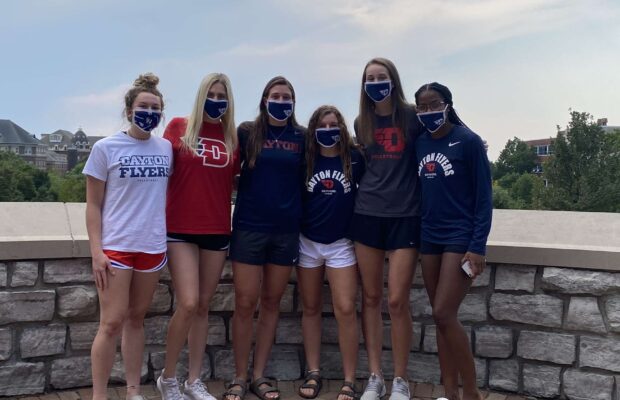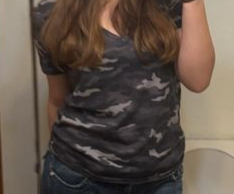CFHS grads adjust to freshman year of college during COVID

As Alayna Yates gets ready for her first day of college at the University of Dayton, it looks a little different than normal. Opening her laptop, she hears the familiar chime and gets ready for her first Zoom call of the day.
A 202 grad, Yates is one of many college freshmen adapting to a new form of college. “Well, on the volleyball side of it, we haven’t been allowed to play much. We were on a ‘code red’ in terms of active cases on campus, so we weren’t allowed to lift or practice for three weeks. This week, we are back in the gym but only for hour-long time slots in groups of four or five, and only two people are allowed to touch a ball before it needs to be sanitized, and we have to socially distance in the gym. We don’t have to wear masks because our gym has no AC, but our coaches have to,” Yates said.
“As for school, I’ve been online the first four weeks. Now, they’re starting to phase us back into in person classes, and by next week all of my classes, except for two that were going to be online since the beginning of the semester, will be in person, at half capacity.”
Yates also experienced a personal brush with the virus that impacted her school year. “I was exposed to COVID by someone on my floor, so a couple weeks ago, I actually came home and quarantined until I got another negative result in Iowa, which I did, thank goodness. It’s been kind of hard on all of my teammates’ mental health I’d say since this isn’t a normal season and we haven’t been able to play like normal. It’s also been hard staying away from everyone in our dorm complex,” Yates said.
“We just want to go out and meet new people, but to protect what we do have for a volleyball season and just for trying to keep ourselves all healthy, we aren’t really allowed to socialize or make new friends. That’s probably been the hardest part.”
Despite the new challenges due to the virus, Yates and her fellow teammates have found ways to maintain social communication despite social distancing safety guidelines. “So, since we aren’t really allowed to spend time with anyone outside of our team, me and the other freshmen on the volleyball team, there’s six of us total, we have movie nights quite often, and we also got hooked on Yahtzee those few weeks we literally weren’t allowed to do anything like lift or practice. All of those nights have been really fun, but one of my favorite nights was when we stayed up till like 2 a.m. talking on a Sunday night a week before any of our classes started. We moved in like two weeks before classes actually started for context because we all went around and each girl talked about what they liked about one another,” Yates said. “It was so sweet to hear all the kind words, and it was something to cheer us up as we were adjusting to dorm life in the COVID era. We’re all pretty close, but that night I think we really became good friends.”
Fellow 2021 grad Sophia Schillinger has faced similar challenges but is still able to go to class in person at St. Olaf in Northfield, Minn. Because of challenges faced by COVID, Schillinger had to adjust her application process.
“I wasn’t able to visit St. Olaf because of COVID,” Schillinger said. “Although I did visit the school a few years ago to visit a friend, I only saw very little of the school. It’s funny. St. Olaf is the only school I didn’t visit, but it’s the one I chose.”
When it came to picking a college, Schillinger said that many factors were part of her decision to go to St. Olaf. “I picked St. Olaf because of its location, primarily. For my mental and physical health, I need access to nature for exercising. I also wanted to live in a small town filled with locals with local businesses and a co-op, very similar to my hometown, Cedar Falls. I also wanted to be near a city that has opportunities for internships. Another thing that made me choose St. Olaf was how much they reached out to me and made sure I was informed about everything when I was applying and deciding on which college I would go to,” Schillinger said.
Schillinger said that new COVID guidelines have been difficult to adjust to, in addition to already adjusting to living in a whole new location. “Oh my gosh, COVID has changed everything. College isn’t even college anymore. First off, the number one stereotype of college, ‘partying,’ can’t even happen, since gatherings of like just even 10 people can be superspreaders,” Schillinger said. “Also, the other part of college, the academic part can’t happen as much because of COVID. I can only meet half of my classmates in person because we split into groups to meet in person for class. I am in group B and only know group B students. Also, studying in buildings is not relaxing and efficient. You have to wear your masks, which I understand why it’s necessary, but it’s definitely not the most comfortable.”
In addition to changes with classes, Schillinger has faced social challenges due to social distancing. “I can’t be close to my friends or show them my screen or share books without getting a citation for breaking COVID rules. Also it is definitely harder to meet people. Number one, not all of my classes are in person, so I’m not meeting as many people. Number two, there are not as many social events, and if there are, they are not in person,” Schillinger said. “It has affected my employment. I wanted to take care of the turtles in the green house, but the green house isn’t open this year, so I had to get a different job.”
Despite COVID challenges, Schillinger said she has found ways to create opportunities with new friends. “My favorite memory so far here at college has been some dinners in the cafeteria with my two best friends Jacob and Riki. We always have these deep conversations and also really funny conversations. I am so happy when I am talking to them,” Schillinger said.
Schillinger said that seniors should focus on applications one step at a time, and not take on too much. “Start earlier than you think you need to. It is difficult to apply for college on top of school work, but if you do it in little chunks over a long period of time, it is not overwhelming. Also, talk to as many people as you can about their college experience and how they decided what college to go to,” Schillinger said.
Yates shared a similar sentiment, and said that despite COVID, seniors should focus on what they do have, rather than what’s been taken away. “My advice to seniors would be to make the most of this senior year in any capacity that you have. I know my high school career didn’t end the way I wanted it to, but I had so much fun my first semester and everything leading up to spring break that I have no regrets about what I did have the chance to do. Treat it like it’s as special as it is and don’t waste any opportunities. Don’t be too eager to get to college. It can wait,” Yates said. “Enjoy senior year and don’t just wish it to be over. I already miss it so much. As for applying to colleges, my experience was kind of unique, but I’d just say find a place you want to call home for the next four years.”









You must be logged in to post a comment Login